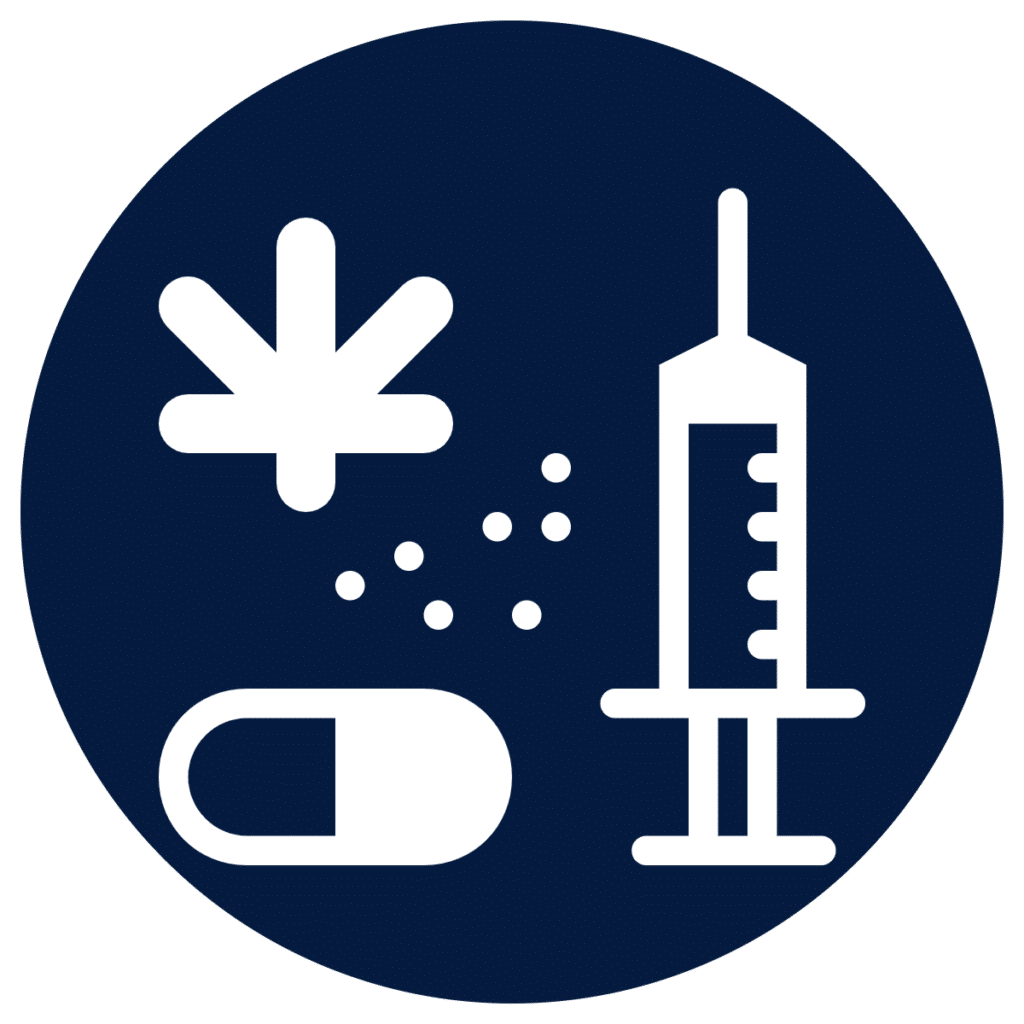In 2019, the FBI estimated that there were over 1,500,000 people arrested for drug crimes in the United States. While some of these charges stayed at the state level, some were escalated to the Federal Courts.
Criminal penalties are almost always more serious and more severe in federal court. The same is most certainly true with federal drug crimes. Knowing how to defend a Federal Drug Crime Case is a unique skill set that not all criminal defense attorneys have. If you or a loved one have been charged with a Federal Drug Crime, the Law Offices Of David R. Silldorf, APC can help.
The laws governing illicit or controlled substances exist at both the state level and the federal level. Often, a person charged with a drug crime is technically in violation of both state and federal law. Even a simple possession for personal use drug crime could technically be charged in federal court.
Understanding the origins of modern federal drug laws dates back to 1970 when President Nixon signed the Controlled Substance Act (CSA). The CSA was created to regulate the distribution and manufacture of illegal substances and established the concept of Drug Schedules. These Drug Schedules classified controlled substances into five categories based on their potential for abuse and medicinal qualities.
A Federal Judge will factor in the drug type and quantity (under the Drug Schedule), the defendant’s scoring criminal history, and any specific offense characteristics under United States Sentencing Guidelines when determining a sentence. Here is a basic breakdown of Drug Schedules:
Schedule I — Includes ecstasy, LSD, heroin, and marijuana.
Schedule II — Includes cocaine, methamphetamine, and morphine.
Schedule III — Includes anabolic steroids, Vicodin, fentanyl, and Marinol.
Schedule IV — Includes Ambien, Xanax, and Valium
Schedule V — Includes Lyrica and cough suppressant.
Federal law can apply to drug crimes that cross international borders, state lines, that occur on federal land, that use or affect interstate commerce in some way (as simple as using a telephone, the internet, a motel, etc.), or that involve trafficking in significant quantities. In contrast, California laws are generally applied to prosecute lower-level drug cases that usually involve much smaller amounts of narcotics. Because both State and Federal authorities have their own drug laws, anyone arrested for an illegal drug offense has the possibility of being charged with a federal crime.
When you find yourself facing Federal Charges, you will need an experienced Federal Defense Attorney. Navigating the overlapping and often contradictory State and Federal laws takes a skilled lawyer who is knowledgeable about Federal Law, Courts, Judges, Appeals, and Sentencing.
These are some of the circumstances that can lead to you being charged with a Federal Drug Crime.
Federal Drug trafficking charges are often filed when a person is found crossing state lines with a large quantity of a controlled substance. Based on their criminal history, the substance in question, and the quantity, this may be charged as a violation of federal law.
Federal Drug trafficking charges are almost always filed when a defendant is arrested at an international border with illegal drugs. Federal drug crimes occur regularly at the U.S. / Mexico international border. People attempt to smuggle all sorts of drugs across the border into the U.S., including methamphetamine, cocaine, heroin, marijuana, fentanyl, and pills.
Drugs are most often secreted in vehicles coming through the various ports of entry. Drugs can also be brought through the border fence, tunnels, over the ocean, or through the air. It is important to note that airports are also considered international borders when entering a terminal that departs or lands in another country.
If you are caught distributing, transporting, manufacturing, or possessing drugs on government property, you may be charged with a federal crime. These areas include federal prisons, federal courthouses, federal office buildings, military bases, as well as national parks.
If you are arrested by a Federal Officer, like a DEA or FBI agent, you will most likely be charged under federal law. If your local police department is partnering with a federal law enforcement agency, you may be arrested by a federal officer and charged with a federal crime.
Confidential informants often exchange information for leniency in their own cases. If an informant is facing federal charges and they cooperated against you, you will likely be charged with a federal crime.
Even if you have a valid prescription for a specific drug, importing a controlled substance from another country is a federal crime. If you are arrested while crossing international borders with a controlled substance, you can be charged with a Federal Drug Trafficking violation. Depending on the substance and the quantity, this can carry a heavy prison sentence.
Shipping controlled substances through the mail can lead to federal charges. Using the United States Post Office, UPS, or FedEx to sell or transport drugs is a federal crime that can lead to your arrest.
State and federal prosecutors often coordinate the prosecutions of drug offenses. It is up to their discretion to decide which violations are charged in federal court. A State charge has the potential to be filed as a new case in federal court if the prosecution decides to seek more severe federal penalties. Many people believe that if they are prosecuted in state or federal court, that they cannot then be prosecuted elsewhere due to double jeopardy. This is false.
The state and federal judicial systems, and the executive branch that include the prosecutors, operate as separate sovereigns. In effect, this means that you can be prosecuted and sentenced for a state crime, be actively serving a state prison sentence on that crime, and be brought over to federal court on a writ of habeas ad prosequendum, charging you with the exact same charge. There is no double jeopardy between state and federal charges.
Federal drug charges can carry Mandatory Minimum Sentences that lead to lengthy prison terms in federal prisons. Federal prosecutors can also enhance a sentence in a number of ways. If a person has one or more prior convictions for drug offenses or violent crimes, they may be considered a “career offender” and face additional penalties. You can also receive an 851 enhancement.
The effect of such enhancement is to double your minimum mandatory exposure. (For example, a 10-year-minimum mandatory would become 20 with one prior drug trafficking offense. If you have two priors, the 20-year-minimum mandatory becomes a minimum mandatory life sentence.)
Federal drug trafficking charges can also be compounded with additional charges such as:
These issues can be further complicated if a defendant enters a plea deal. While the majority of federal cases resolve with a plea agreement and not a trial, a potential effect of the agreement may be to limit a defendant’s ability to appeal a judge’s ruling or sentence. The harsh penalties attendant to federal cases are made worse by the lack of opportunity for electronic home monitoring, house arrest, and the rarity of probationary sentences.
Our first priority in a federal criminal drug case is to get our clients released on bail. Bond hearings are different in federal court than they are in California state courts. One common similarity, however, is that a judge must determine whether a defendant poses a danger to the community or is a risk of flight if released on bond. We always argue for the pretrial release for the benefit of our clients and their case. When a criminal defendant is on bond, they are better able to assist in their own defense.
At the Law Offices of David Silldorf, APC, our goal is to achieve the best possible outcome for our clients. We will seek dismissal of charges, an acquittal at trial, probation or a time-served sentence, or the lowest sentence possible under Federal Sentencing Guidelines. If a client wants to go to trial, we won’t hesitate to help vindicate our clients through the criminal jury system.
To attain this, we will fight using whatever means necessary throughout the court process including, but not limited to the following:
With the help of a knowledgeable, experienced, and skilled federal criminal defense attorney, you can turn a seemingly hopeless case into a legitimate defense—and win.
Federal drug laws are complicated, and the consequences for drug crimes can be severe. If you are arrested for a drug crime in San Diego, David Silldorf is ready to provide you with an experienced defense.
David Silldorf has been designated by the Federal U.S. District Court for the Southern District of California as an experienced criminal practitioner qualified to handle appointments arising under the Criminal Justice Act.
The firm’s proximity to the international border has a strong influence on David’s caseload. He regularly represents individuals charged with drug trafficking and alien smuggling offenses and drug-related federal conspiracy cases, and other offenses involving firearms.

United States v. an Individual
[19-CR-02264-AJB]
Importing 18.84 kilograms (41.53 pounds) of methamphetamine from Mexico into the U.S.
DISMISSED

United States v. an individual
[possession of methamphetamine]
Client was arrested by Bureau of Land Management (BLM) officers for possession of methamphetamine.
NO CHARGES FILED

United States v. an individual
[19-MJ-03140-MSB]
Possession with intent to distribute a controlled substance (over 5 kilograms of cocaine) while onboard a vessel on the high seas.
DISMISSED